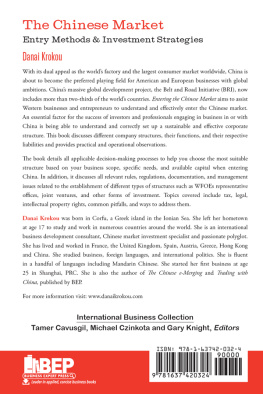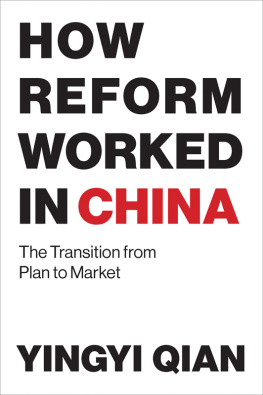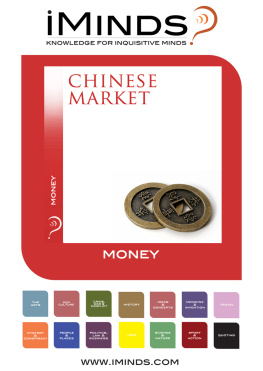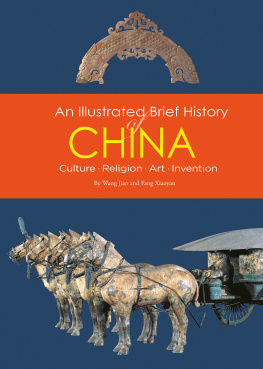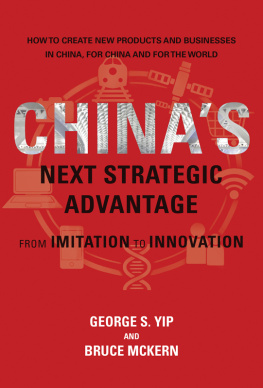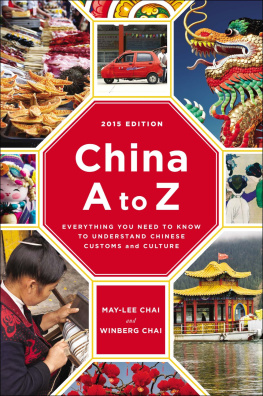Barbara Xiaoyu Wang - Chinese Leadership
Here you can read online Barbara Xiaoyu Wang - Chinese Leadership full text of the book (entire story) in english for free. Download pdf and epub, get meaning, cover and reviews about this ebook. year: 2011, publisher: Palgrave Macmillan, genre: Politics. Description of the work, (preface) as well as reviews are available. Best literature library LitArk.com created for fans of good reading and offers a wide selection of genres:
Romance novel
Science fiction
Adventure
Detective
Science
History
Home and family
Prose
Art
Politics
Computer
Non-fiction
Religion
Business
Children
Humor
Choose a favorite category and find really read worthwhile books. Enjoy immersion in the world of imagination, feel the emotions of the characters or learn something new for yourself, make an fascinating discovery.
- Book:Chinese Leadership
- Author:
- Publisher:Palgrave Macmillan
- Genre:
- Year:2011
- Rating:4 / 5
- Favourites:Add to favourites
- Your mark:
- 80
- 1
- 2
- 3
- 4
- 5
Chinese Leadership: summary, description and annotation
We offer to read an annotation, description, summary or preface (depends on what the author of the book "Chinese Leadership" wrote himself). If you haven't found the necessary information about the book — write in the comments, we will try to find it.
Chinese Leadership — read online for free the complete book (whole text) full work
Below is the text of the book, divided by pages. System saving the place of the last page read, allows you to conveniently read the book "Chinese Leadership" online for free, without having to search again every time where you left off. Put a bookmark, and you can go to the page where you finished reading at any time.
Font size:
Interval:
Bookmark:
Chinese Leadership
Chinese Leadership
Barbara Xiaoyu Wang
Programme Director and China Representative at Ashridge Business School, UK
and
Harold Chee
Programme Director at Ashridge Business School, UK


Barbara Xiaoyu Wang & Harold Chee 2011
All rights reserved. No reproduction, copy or transmission of this publication may be made without written permission.
No portion of this publication may be reproduced, copied or transmitted save with written permission or in accordance with the provisions of the Copyright, Designs and Patents Act 1988, or under the terms of any licence permitting limited copying issued by the Copyright Licensing Agency, Saffron House, 6-10 Kirby Street, London EC1N 8TS.
Any person who does any unauthorized act in relation to this publication may be liable to criminal prosecution and civil claims for damages.
The authors have asserted their rights to be identified as the authors of this work in accordance with the Copyright, Designs and Patents Act 1988.
First published 2011 by
PALGRAVE MACMILLAN
Palgrave Macmillan in the UK is an imprint of Macmillan Publishers Limited, registered in England, company number 785998, of Houndmills, Basingstoke, Hampshire RG21 6XS.
Palgrave Macmillan in the US is a division of St Martins Press LLC, 175 Fifth Avenue, New York, NY 10010.
Palgrave Macmillan is the global academic imprint of the above companies and has companies and representatives throughout the world.
Palgrave and Macmillan are registered trademarks in the United States, the United Kingdom, Europe and other countries.
ISBN 9780230248182
This book is printed on paper suitable for recycling and made from fully managed and sustained forest sources. Logging, pulping and manufacturing processes are expected to conform to the environmental regulations of the country of origin.
A catalogue record for this book is available from the British Library.
A catalog record for this book is available from the Library of Congress.
10 9 8 7 6 5 4 3 2 1
20 19 18 17 16 15 14 13 12 11
Printed and bound in Great Britain by
CPI Antony Rowe, Chippenham and Eastbourne
Contents
Figures and Tables
Figures
Tables
Foreword
The challenges of leadership get even bigger when the members of the team youre leading come from different backgrounds and different cultures to your own. For the new expatriate manager in China there is much to learn. Whilst in many of the Chinas cities, the architecture and infrastructure give the misleading impression that one could be almost anywhere in the world, there are, very close to the surface, layers of Chinese-ness which can often be difficult to comprehend.
Today there are more and more overseas companies coming to China to invest, trade or to provide services. As China becomes stronger, there is less willingness on the part of Chinese business partners and staff to merely accept the norms and behaviors of the overseas company and therefore it becomes increasingly important that the expatriate manager understands and can empathize with his Chinese counterparts.
Furthermore, many Chinese companies are offering real competition for many products and services. In order to counter this, the foreign company has to be able to operate effectively in this changing market. They need to have a better understanding of the Chinese than they did 1520 years ago.
I have the pleasure of knowing Barbara and Harold for a long time. Not only do they have first-hand experience of working in China; but also tremendous experience in teaching Western management concepts and practice to groups of Chinese managers and sharing their insights into Chinese business culture with Western managers. In the first part of this book, they have eloquently captured the fundamentals of Chinese business culture and its philosophical roots. In the second part of the book, they build on this cultural base and provide sound advice on the actual practice of managing in China
I have worked in international, multicultural environments nearly all my working life and have spent the last ten years working with the ChinaBritain Business Council in Beijing. We provide advice and assistance to British companies entering or working in the China market. I strongly recommend this book to the many new managers and leaders who will come to China or work with Chinese companies outside China.
Brian Outlaw,
Executive Director,
China Britain Business Council,
Beijing, China. 2011.
Introduction
China, as we all know, is booming. This book is an attempt to look at one aspect of that boom, leadership. Are there styles of leadership particular to China? If so, what are they? How do they work? And are they transferable to international organizations? For international business seeking to build a presence in China, what kind of leadership will their Chinese employees expect? What kind of leadership will work best?
At a deeper level still, there is a debate about how China itself can lead the world, not just economically but morally. The old Western model is looking ever more dented since Enron, Worldcom and the greed-driven crisis of 2008. In response to this opportunity, China has begun to re-examine its mighty intellectual traditions, especially Confucianism and Buddhism.
In truth, these traditional cultural values have always shaped leadership and management practices in China and in countries influenced by it. For example, when Redding (1982) and Franke, Hofstede and Bond (1991) looked at what were then termed the Asian Tiger economies of Singapore, Taiwan, South Korea and Hong Kong, they established a close link between economic development and Confucianism.
The Confucian focus on the soft side of society is aptly summed up in an old Chinese proverb:
If you want one year of prosperity, cultivate grains.
If you want ten years of prosperity, cultivate trees.
If you want one hundred years of prosperity, cultivate PEOPLE.
The focus of this book is twofold. Firstly, our attention will be on how Chinese leadership is very much influenced by traditional Chinese philosophies and value systems not just those of Confucius and on the impact this has on the workplace. Secondly, we will look at Western concepts of management and leadership, and see how they need to be adapted to work in the Chinese context: Western leaders in China may find that what made them successful and effective back home may not work in their new setting. This is a practical book to help leaders and managers working in China learn how to manage a workforce that has a different cultural mindset, and to show them how to do so sensitively and empathetically.
The book is divided into two parts. Part 1 consists of five chapters with a focus on the background of Chinese philosophy and the cultural environment. describes different types of commercial organization in China, and the different leadership styles and challenges relevant to them.
The main focus of Part 2 is on how to make it happen. Its five chapters explore some of the major Western leadership and management concepts in detail, ways in which these concepts are perceived by the Chinese and the ways they can best be adapted and utilized in China. cover communications, team management, delegation and decision-making, negotiations and coaching.
There has to be a health warning on any literature dealing with China and the Chinese: China has been a land of myth, mystery and exaggeration for the West since Marco Polo came back to thirteenth-century Venice with tales of cities of a million people (unheard of in those days), unimaginable wealth, exotic food and strange customs. Maybe the only consistent theme in the Wests perception of China has been its inconsistency, or rather a Western desire to see in China what it wants to see. As traveler Stephen King-Hall said in 1924:
Next pageFont size:
Interval:
Bookmark:
Similar books «Chinese Leadership»
Look at similar books to Chinese Leadership. We have selected literature similar in name and meaning in the hope of providing readers with more options to find new, interesting, not yet read works.
Discussion, reviews of the book Chinese Leadership and just readers' own opinions. Leave your comments, write what you think about the work, its meaning or the main characters. Specify what exactly you liked and what you didn't like, and why you think so.




